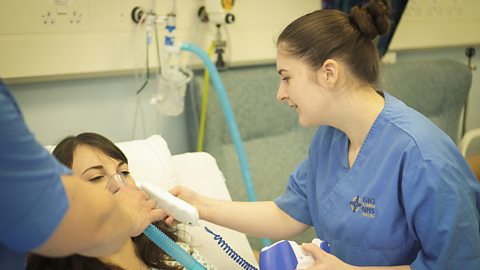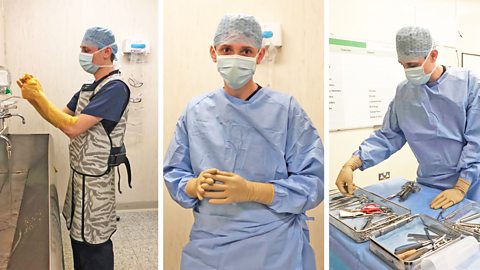Nurses care for patients who are sick, injured or have disabilities. There are four specialities: adult nursing, children's nursing, learning disability nursing, and mental health nursing.
From September 2020, new are available for eligible undergraduate and postgraduate student nurses to help fund their studies. The money is a training grant, rather than a loan, so doesn't have to be repaid.
Scroll down to hear from people currently working as nurses to learn more about routes into the role and discover what you could expect on the job.

Real-life nurses' stories
Kate: critical care nurse. video
Kate started working as a nurse the Monday after she finished her university degree.

Sarah: critical care staff nurse
Sarah works as a staff nurse in a critical care unit in Cardiff.

Connor: orthopaedic scrub nurse
Connor assists with surgical procedures.

Jake: mental health nurse. video
Jake's a mental health nurse who responds to calls that have been made to 999.


What to expect if you want to be a nurse
- Nurse average salary: NHS band 5-6. Read more about . Salaries will differ in private healthcare.
- Nurse typical working hours: 37 to 42 hours per week
What qualifications do you need to be a nurse?
- Typical entry requirements:
- University: Most people qualify by studying a degree in Nursing. You first need to decide which area of nursing you'd like to work in: adult nursing, children's nursing, learning disability nursing, or mental health nursing. Some "dual field" degrees allow you to study in two of the fields. Full-time courses usually take three years. You may be able to join a nursing degree on the second year of a course if you already have a degree in: a health-related subject; Psychology; Life Sciences, or Social Work
- Apprenticeship: You may be able to do a "registered nurse degree apprenticeship (RNDA)", combining academic study and on-the-job training. You will need to secure a position as an RNDA and your employer will release you to study at university part time. Most RNDAs take four years, but it could be less if you have relevant previous learning and experience. Keep an eye on the and the Government for RNDA opportunities
- Armed forces: You can train for a career as a nurse in the Armed Forces. Check out the , and websites for more information
- Nursing associate: Nursing associates work alongside health care support workers and registered nurses in both health and social care. You could start out as a and work towards training as a registered nurse.
You'll find it helpful to get some paid or voluntary experience in social care or healthcare work before you apply for nurse training.
Sources: LMI for All, National Careers Service, NHS Health Careers
This information is a guide and is constantly changing. Please check the website for the latest information and all the qualifications needed.
For careers advice in all parts of the UK visit: , , and .

Find out more
For more information about careers in nursing, you can check out:
- The
- The .
For careers advice in all parts of the UK visit: , , and .

Job inspiration: Careers in healthcare and frontline services. collection
Hear from people working across the healthcare sector and in frontline services, including some roles you may not know existed!

ґуПуґ«ГЅ One's Ambulance: Meet the real life heroes. collection
A collection of articles and stories from ґуПуґ«ГЅ One's series Ambulance.

Jobs that give back: My frontline career. video
Hear from four young people – a firefighter, nurse, police sergeant and coastguard – who are helping others via their frontline careers.
